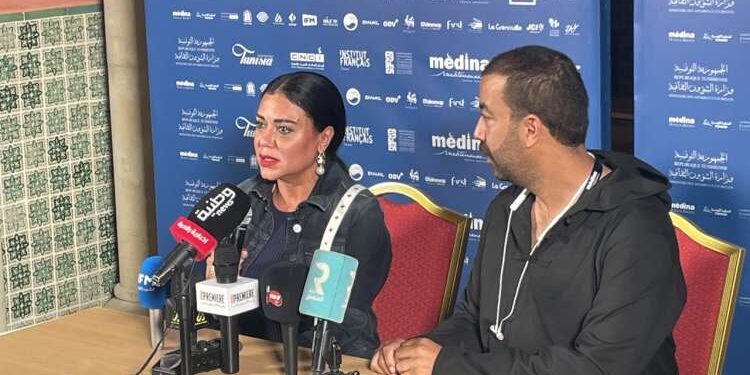Egyptian actress Rania Youssef is the guest of honor of the second edition of the Master International Film Festival, which takes place from May 6 to 13, 2023 in Yasmine Hammamet (Tunisia).
During a press briefing, she expressed her great joy at being in Tunisia for the fourth time. She evoked her affection for the Tunisian people, which she describes as “civilized” and whose tolerance and freedom of mind she appreciates. The actress also welcomed women’s rights in Tunisia, making this Arab country the one where women have the greatest freedom and the greatest equality. As a woman and mother of two daughters, women’s rights are very important for her.
Rania Youssef also mentioned her admiration for feminist activist Nawal El Saadawi, who is very appreciated by Tunisians. She considers her as an inspiration for her. She recalled that Nawal Saadawi was an important voice in the struggle for women’s rights in Egypt and in the Arab world, and that it continues to be an emblematic figure for feminists.
On a professional level, Rania Youssef said that she would be honored and happy to work in Tunisia, even for free. This has of course aroused happy and fun reactions from the journalists present. A call is therefore launched to Tunisian directors and producers!
Speaking of the influence of cinema and television series in the promotion of women’s rights, such as the film Ouridou Hallan/I want a solution (1975), who had advanced the law on divorce in Egypt, Rania explained that cinema and soap operas could advance influencing citizens and therefore the rulers to push them to change retrograde legislation. She also said that the soap opera Taht el wissaya/under guardianshipbroadcast during the Ramadan of this year, aroused a debate on the supervision imposed on widows concerning their minor children in Egypt, which was ultimately brought before the Parliament. She firmly believes that cinema and the media have the power to cause significant changes in society.
Rania Youssef also talked about her personal experiences and her life choices. She revealed that she had the opportunity to go to Japan and even marry a producer there, but she preferred to stay in Egypt. For her, being far from her friends and family is unthinkable. She also considers that each culture has its own traditions and customs, which makes life in another country difficult. Rania prefers to stay in an Arab culture that is familiar to her.
Neïla Driss
Egyptian actress Rania Youssef is the guest of honor of the second edition of the Master International Film Festival, which takes place from May 6 to 13, 2023 in Yasmine Hammamet (Tunisia).
During a press briefing, she expressed her great joy at being in Tunisia for the fourth time. She evoked her affection for the Tunisian people, which she describes as “civilized” and whose tolerance and freedom of mind she appreciates. The actress also welcomed women’s rights in Tunisia, making this Arab country the one where women have the greatest freedom and the greatest equality. As a woman and mother of two daughters, women’s rights are very important for her.
Rania Youssef also mentioned her admiration for feminist activist Nawal El Saadawi, who is very appreciated by Tunisians. She considers her as an inspiration for her. She recalled that Nawal Saadawi was an important voice in the struggle for women’s rights in Egypt and in the Arab world, and that it continues to be an emblematic figure for feminists.
On a professional level, Rania Youssef said that she would be honored and happy to work in Tunisia, even for free. This has of course aroused happy and fun reactions from the journalists present. A call is therefore launched to Tunisian directors and producers!
Speaking of the influence of cinema and television series in the promotion of women’s rights, such as the film Ouridou Hallan/I want a solution (1975), who had advanced the law on divorce in Egypt, Rania explained that cinema and soap operas could advance influencing citizens and therefore the rulers to push them to change retrograde legislation. She also said that the soap opera Taht el wissaya/under guardianshipbroadcast during the Ramadan of this year, aroused a debate on the supervision imposed on widows concerning their minor children in Egypt, which was ultimately brought before the Parliament. She firmly believes that cinema and the media have the power to cause significant changes in society.
Rania Youssef also talked about her personal experiences and her life choices. She revealed that she had the opportunity to go to Japan and even marry a producer there, but she preferred to stay in Egypt. For her, being far from her friends and family is unthinkable. She also considers that each culture has its own traditions and customs, which makes life in another country difficult. Rania prefers to stay in an Arab culture that is familiar to her.
Neïla Driss








